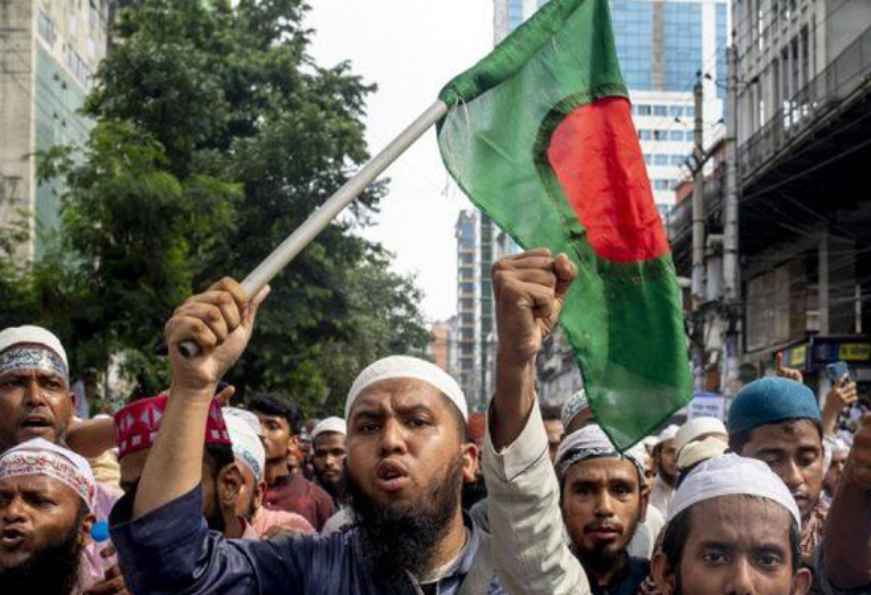
After being banned from contesting elections for a decade, the largest Islamic party in Bangladesh, the Jamaat-e-Islami, held its first political rally on the streets of the capital city of Dhaka in June this year. Its demands are three-fold: Controlling high prices of daily essentials; the release of its Ameer, Shafiqur Rahman and other leaders; and holding the next national election under a caretaker government. Amongst other factors, it is believed that the Jamaat has leveraged the United States’s (US) increasing interest to ‘ascertain democracy’ in Bangladesh to return to the political scene, as the countdown begins for its upcoming general elections, to be held between December 2023 and January 2024.
Jamaat’s rally, which was conducted with police and government permission, is viewed by some as proof that American efforts have had an impact on Dhaka’s domestic politics.
In the past few years, the US has tried to reset the terms of its engagement with the Sheikh Hasina government on multiple occasions by imposing sanctions over allegations of human rights abuse on seven former and current high-level officials of Bangladesh’s Rapid Action Battalion; setting up meetings between the American Ambassador to Bangladesh, Peter Haas, and the families of the victims of alleged abductions, including the family of Sajedul Islam Sumon, a leader of the Opposition party, the Bangladesh Nationalist Party (BNP); not inviting Bangladesh to its Democracy Summits; and placing restrictions on the issuance of visas for any Bangladeshi individual believed to be responsible for, or complicit in, undermining the democratic election process in Bangladesh. Jamaat’s rally, which was conducted with police and government permission, is viewed by some as proof that American efforts have had an impact on Dhaka’s domestic politics. However, a reversal of the ban on Jamaat is also likely to affect Bangladesh’s neighbourhood, especially India.
Indian origins of the Jamaat
Jamaat has been reported to be “rabidly anti-India” and “stridently pro-Pakistan” to the extent of being a “puppet of the ISI,” (Inter-Services Intelligence—Pakistan’s intelligence agency), although the origins of the Jamaat lie in India. It was formed in 1941 by Abul A’ala Maududi, a thinker from Hyderabad, India, after his disillusionment with the Indian National Congress over its prioritisation of the Hindu Mahasabha faction within the party. Maududi believed in Islamic governance and subsequently conceptualised Jamaat-e-Islami on the principle of ‘Hakimiya’, according to which, sovereignty belongs to God and not human beings. After Partition, Maududi moved to Pakistan to preach his ideas and was vehemently opposed to the liberation war fought by East Pakistan to become Bangladesh, as it idolised Bengali nationalism over an Islamic identity. After the birth of Bangladesh, although the party worked with both the Awami League (1986 and 1995-1996) and the BNP, many of its leaders were put on war trial and sentenced to death and imprisonment for their support of the Pakistani Army in the subjugation of the ‘Muktijuddho’ after Sheikh Hasina’s electoral victory in 2008. Eventually, in 2013, the party was declared illegal by the Dhaka High Court for constitutional breach and was banned from contesting elections. Although it is unlikely that the Jamaat will secure a parliamentary majority on its own in the scheduled elections, its help may substantially strengthen the position of the BNP, which has had a difficult relationship with India in the past.
Maududi believed in Islamic governance and subsequently conceptualised Jamaat-e-Islami on the principle of ‘Hakimiya’, according to which, sovereignty belongs to God and not human beings.
India’s furrowed brows
For India, which shares excellent terms with the current Hasina-led government, such a situation is undesirable, especially as Bangladesh is the lynchpin of its Neighbourhood First and Act East Policy. Foreign relations aside, Bangladesh is also crucial for India’s domestic development as a convenient means of providing its remote Northeastern Region with an access to the sea and expanding its connectivity and commerce. The country is also India’s largest trading partner in South Asia and is considered its closest ally in the region. From the security perspective, cooperation with Bangladesh is essential for India to jointly tackle collective concerns such as illegal fishing, climate change, and human trafficking.
From the perspective of New Delhi, any pressure on Dhaka that might strengthen fundamentalist forces within the Opposition—that the Hasina regime has worked hard to keep at bay—will end up undermining regional stability. It is interesting to note that the US Department of State in its “Country Report on Terrorism 2006”, had accused the Islami Bank, which had several board members from Jamaat-e-Islami, of funding the Jamaat-ul-Mujahideen—a terrorist organisation. A weakening of Prime Minister Hasina’s political leverage would also push Bangladesh closer to China—a situation which both India and the US are keen to avoid. While Beijing is actively digging its heels deeper into Dhaka through multiple investments and projects, the current Bangladesh government has managed to keep its engagements solely commercial through deft diplomacy.
A weakening of Prime Minister Hasina’s political leverage would also push Bangladesh closer to China—a situation which both India and the US are keen to avoid.
Avoiding a broad brush
On 22 September this year, the US Department of State took fresh steps to enforce visa limitations on Bangladeshi individuals who ‘have played a role in obstructing the democratic electoral system’. This includes members of law enforcement agencies, the governing party, and the political Opposition. Clearly, the Biden administration knows how much to push, as has been depicted recently apropos China with its order of restraint against the US Ambassador to Japan. Bangladesh is no less important to the geopolitics of South Asia, straddling Japan and India—two important nodes in Biden’s Indo-Pacific vision. While its latest visa restrictions and other similar steps underline a pattern of thought in Washington, DC, too much pressure on the incumbent Hasina government could limit Dhaka’s manoeuvring space and potentially lead to steps towards securing the domestic political standing more firmly, which may be even more unpalatable for DC. Furthermore, political reaffirmations inside Bangladesh will also have a set of repercussions for Dhaka’s external relations in South Asia and beyond.
Bangladesh is no less important to the geopolitics of South Asia, straddling Japan and India—two important nodes in Biden’s Indo-Pacific vision.
Democratic overreach is a quintessential characteristic of the Biden administration, underscored by the values of its Democratic Party in the US. But often, this has to be tempered by regional complications and priorities when applied to different countries. A standardised application of democratic ideals and principles across the Global North and the Global South is a project doomed for failure. History is replete with examples of such failures, including the most recent one in Afghanistan. Washington should learn to live with different tents of democracies, as opposed to all states living inside one big tent stamped by it. As the Global South grows in economic power, it will push the West for more accommodation; much of this push will concern the use of slightly different metrics by the Global South to view democracy, human rights, freedom of expression, and other principles.
Sohini Bose is an Associate Fellow at Observer Research Foundation
Vivek Mishra is a Fellow with the Strategic Studies Programme at Observer Research Foundation
The views expressed above belong to the author(s). ORF research and analyses now available on Telegram! Click here to access our curated content — blogs, longforms and interviews.




 PREV
PREV



